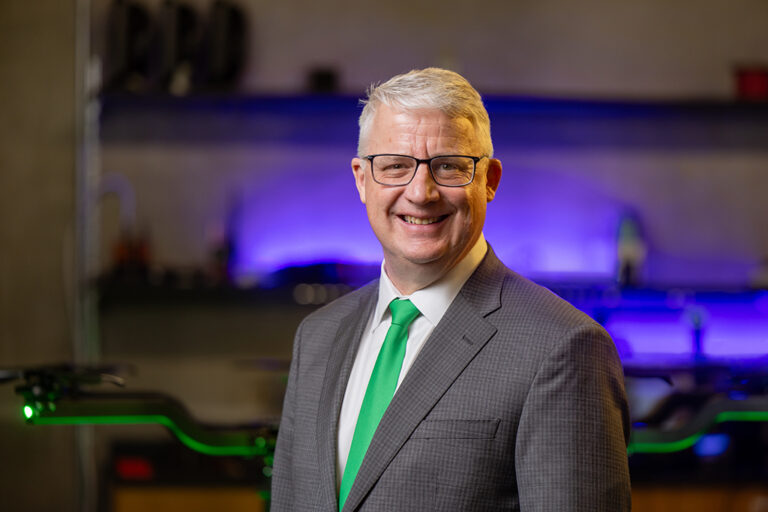Building human infrastructure
UND’s Geiger part of new $20M health NIH grant to grow research and nurture new researchers in rural states

A large new grant is helping UND better serve the people of North Dakota by ramping up research on aging, cognition and brain health.
The UND School of Medicine & Health Sciences (SMHS) is a partner institution in the recently unveiled Great Plains IDeA-CTR Network, made possible by a $20 million grant from the National Institutes of Health to the University of Nebraska Medical Center in Omaha.
Rural states like North Dakota are at a disadvantage when it comes to attracting funding for medical research, and this project is meant to help address that void.
At UND, the grant will help researchers study cognitive issues and neurodegenerative diseases such as Alzheimer’s disease and Parkinson’s disease, roll out treatment strategies and then assess their effectiveness.
“These issues challenge the medical and scientific community,” said Jonathan Geiger, a Chester Fritz Distinguished Professor of Biomedical Sciences at the SMHS and an international expert in neurodegenerative diseases. “This will help us understand disease development, identify prevention and treatment strategies and study the effectiveness of those treatments.”
Geiger will serve as institutional coordinator at UND for the new network.
Growing researchers
The grant also will enable mentoring of junior faculty and researchers wishing to gain expertise in “conduction studies” that serve as bridges between basic research and clinical studies. Basic research is meant to increase knowledge about an issue. Clinical research tests the safety and effectiveness of drugs, and develops diagnostic tests and devices that can be used to detect, treat, prevent or track a disease.
Geiger will work to identify early-career researchers who deserve funding for their projects.
At UND, Geiger has an internationally recognized background in basic research, has consistently held multiple funding grants throughout his career and is a go-to consultant for the NIH when it comes to reviewing grant applications for research funding. He’s also a principal investigator for the Center of Biomedical Research Excellence grant on Pathophysiological Signaling in Neurodegenerative Diseases at the UND.
In April, he was elected president of the Society on NeuroImmune Pharmacology at the international body’s annual meeting in Krakow, Poland. And before that, he received the society’s top honor, the Joseph Wybran Award, for extraordinary contributions to the advancement of the fields of neuroimmunology, drugs of abuse and immunity to infections.
Rural focus
The Great Plains IDeA-CTR Network also will expand research teams, disseminate resources, decrease duplication and increase collaborations with adjacent states. North Dakota State University, the University of South Dakota and the University of Kansas Medical Center also are partner institutions for the network.
“The states involved in our grant are rural states, so we will put extra emphasis on projects that will benefit people in rural areas or the medically underserved,” said Matthew Rizzo, professor and chair of neurological studies at Nebraska and the project’s principal investigator. “We want to fill in the health gaps in the Great Plains area. We have unique needs.”
Most states have teaching hospitals attached to their medical schools, said Geiger. At UND, the SMHS relies on part-time and volunteer physicians across the state to train medical students and run programs. Because of this, “It’s a challenge to train people to conduct clinical studies,” he said.
The network will focus on developing early career researchers into independent scientists and increasing the human infrastructure and other resources needed to support clinical research around the region.
“This isn’t a bricks-and-mortar grant,” said Geiger. “It’s a human infrastructure grant…the goal is not to build a building. It’s to develop health enhancement programs that stick.”


